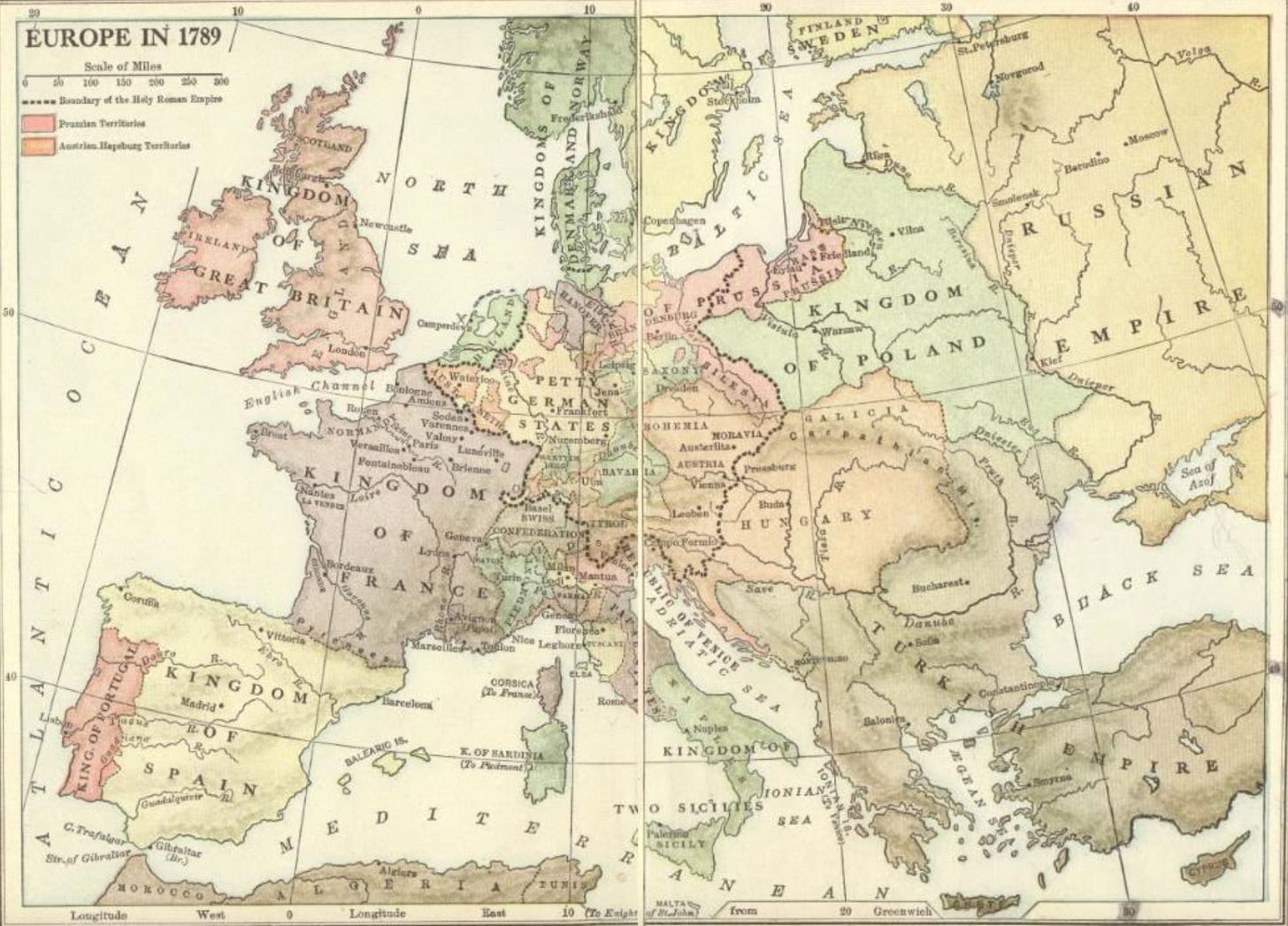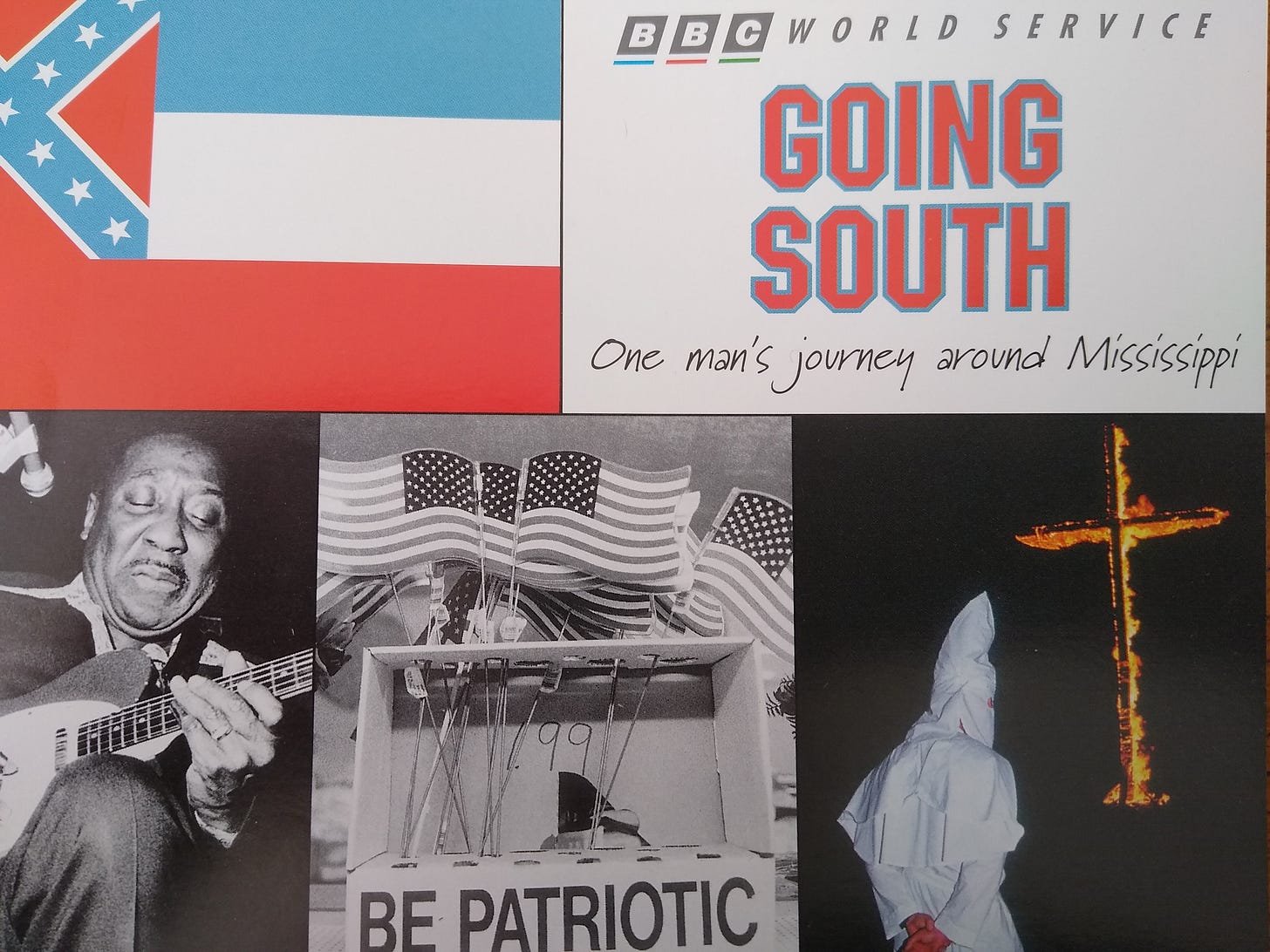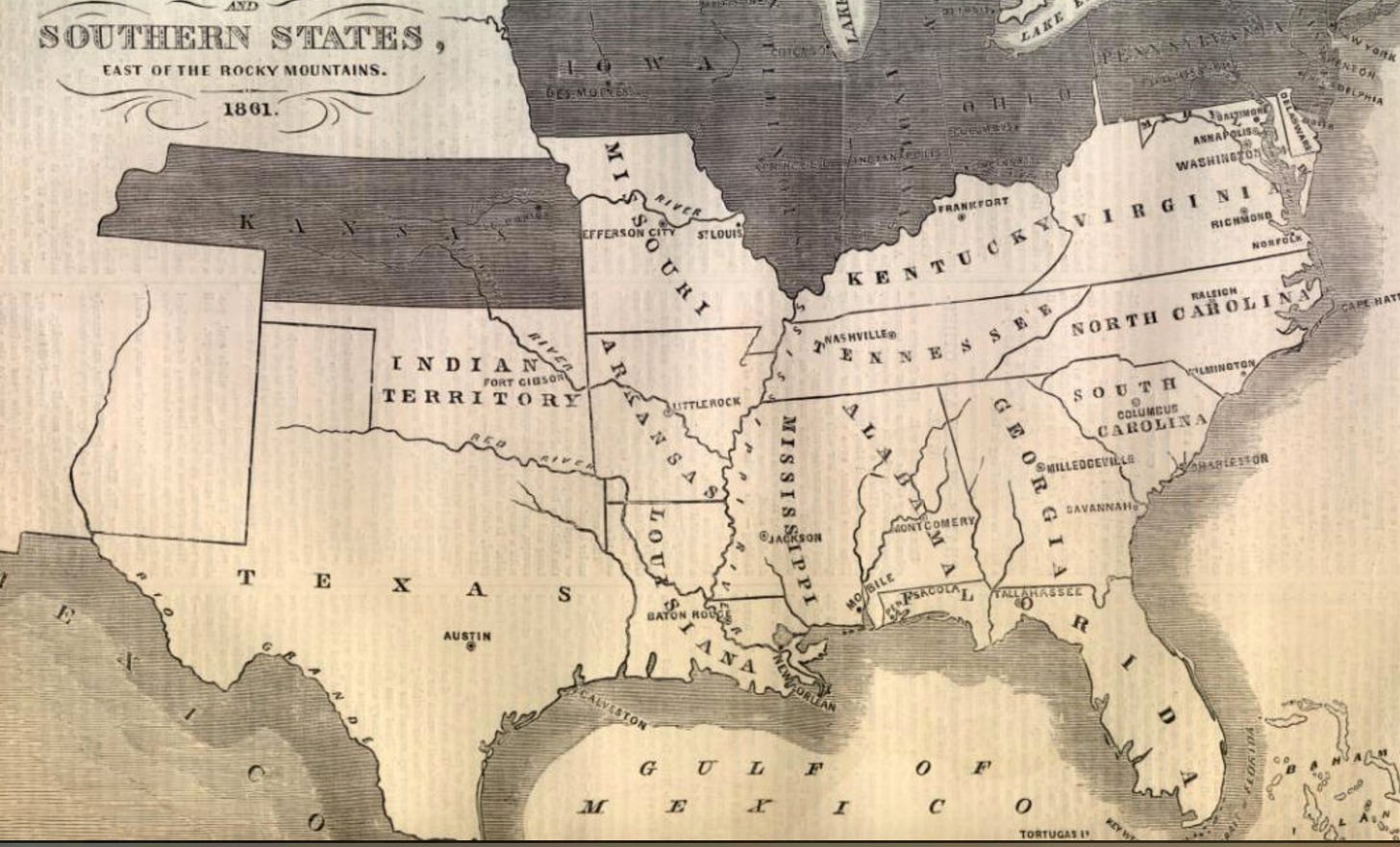WHAT IS A NATION IN THE 21ST CENTURY?
And What Does the Answer Mean for America's Survival in its Present Form?
This is a serious question, one that grows from the simple truths I learned covering the civil wars of the post-Soviet world:
Nations come. Nations go. Nations change. No nation is forever.
So why should America last forever in its present configuration? No other nation-state or empire has.
No state is eternal within fixed boundaries, not even Rome, the so-called Eternal City. Eventually, its territory became too vast to administer from one place, and the mindset of its citizens — those in the east and those in the west — how they viewed the world, their cultural and social differences became irreconcilable and led to the Empire splitting apart.
Within a century, the Western half of the Empire, centered on Rome itself, would be overrun by barbarian tribes and in 476 AD, the Western Empire came to an end. The Eastern Empire, with its capital at Constantinople/Byzantium but whose citizens considered themselves “Roman”, continued as an entity for another 1000 years, until its conquest by the Ottomans in 1453. (The dates in this para are the generally used ones, you can find challenges to them easily enough but I prefer these)
It is a bit cliche’d to make comparisons between the US today and Rome. Hollywood never tires of doing it. The Financial Times’ Chief Economics Commentator Martin Wolf even did it in his column July 8, 2025:
… the birth of the United States of America was to be a hugely significant moment. The US had the potential to become the first truly mighty republic since the Roman one, which perished at the battle of Actium in 31BC
I’m not sure how far the analogies hold up. Unlike the US, Rome was a city-state and the Empire was a polyglot, multi-national assemblage so perhaps it’s best to begin exploring for the answer to what a Nation is today — specifically what the American nation is today — in history that parallels America’s own revolutionary beginnings in 1776.
This was Europe in 1789, on the eve of the French Revolution. First question: Where’s the nation called Germany? Second question: Why does Poland include much of Ukraine and Belarus? Why do so few of the 28 nation-states of the present day EU — including one of its founding members, Italy — exist on this map?
Now look at this map of Europe just 15 years later:
Still no Germany but now there’s no Poland either. And there’s still no Italy, why? What happened in those 15 years? Napoleon happened, and then after he was sent into exile (for the first time) the Congress of Vienna, where this map of the Continent was redrawn, happened. The Treaty was hastily signed because Napoleon had returned from Elba reconvened his troops and was marching towards Brussels. The leaders needed to race off from Vienna and confront him a few weeks later at Waterloo.
Even though they are not present in this map, all the nations we are familiar with today still existed in 1815. They just weren’t political entities, in other words nation-states.
But let’s bring this even closer to the present day.
Since 1989 within the area circumscribed by the borders of NATO and the EU there are 8 new nation-states, created by the violent disintegration of Yugoslavia and the velvet divorce of Czechoslovakia into Czechia and Slovakia. Nine if you include Kosovo in former Yugoslavia. The German Democratic Republic agreed to be purchased by the German Federal Republic and disappeared from the map.
How many other nation-states were created by the collapse of the Soviet Union?
But this is a very euro-centric precis, let’s broaden it out:
The first year I lived in Britain, on a university junior year abroad, the eastern part of Pakistan already geographically split in two by Britain’s hasty Partition of India, rebelled against the larger western half and after horrendous violence, including mass rape, the nation of Bangladesh was created in 1971.
This process was repeated on and on and on across the world. The collapse of European empires was part of the reason but the definition and redefinition of nation as represented through a nation-state is a constant, dynamic process.
If you look at a map of Africa before the British, French, Belgians, Germans and Portuguese carved the continent up you won’t see the map of today. The post-colonial map of Africa continues to be rendered obsolete all the time. Currently there are shooting wars of national self-determination going on in Sudan and Ethiopia
Whatever a Nation is, it is not static. It is a perpetually evolving thing.
I began asking myself the question “What is a Nation?” in the 1990s when, as NPR’s London correspondent, I covered conflicts that had frustrated nationhood at their core: Northern Ireland, the Bosnian war, and Iraqi Kurdistan. At the same time I was observing and reporting on the deadly violence in those places, I reported on the peaceful negotiations led by former enemies, France and Germany, to create a closer, more federal union of European nation-states—the EU—with no internal national borders and a single monetary currency, the Euro. The Union’s structures required its members to surrender a certain amount of national sovereignty. Britain, the third of Europe’s Big Three countries, stood off to the side during this process.
During this same period, I reported for the BBC on the American South and was amazed by the depth of unextinguished feelings for the idea of a Southern nation.
For me the question deepened in importance a decade later while working on my book, Emancipation: How Liberating Europe’s Jews from the Ghetto Led to Revolution and Renaissance. The book ended up being as much about the creation of the modern nation-state in Europe, particularly Germany, as about Jews being let out of their ghettos and given full rights of citizenship. Across Europe the laws regarding citizenship of a given country were constantly changing as the idea of nationhood evolved from ethno-nationalist myth to a practical, political concept that made democratic governance and a modern economy possible.
Country by country the status of emancipated Jewry’s civil rights became a critical component of the definition of citizenship, a process analogous to how the civil rights of African-Americans in post-Civil War America became part of the definition of US citizenship.
The question of nationhood confronted me in stark personal terms in 2016. Nationalism became the decisive factor in two epoch changing elections in the countries where I hold citizenship: the US and the UK. Americans elected Donald Trump and Britons voted to leave the European Union. I reported on both of these events and have been trying to make sense of the fall out ever since.
And in case I might have lost interest in the question, another country to which I have a connection, Ukraine, was invaded by Russia in February 2022. My connection is this: both sides of my father’s family trace their origins to Ukraine, except Ukraine did not exist as a nation-state then. My grandmother thought of herself as an Austrian Jew from Lemberg, today L’viv, because it was in the Austro-Hungarian province of Galicia. My grandfather identified as a Russian Jew, because his father came from Odesa in what was then the Russian empire.
What country did my family come from: Ukraine, Russia, or Austria?
What is a Nation? I did my first reporting from Ukraine in 2012 and went back in 2018 to look at the surprising return of Jewish life to the country. In autumn 2022, I returned to a country fighting for its life against Russia. At the core of the fight was the question of whether there was a separate Ukrainian nation at all. The extraordinary resistance of Ukrainians was proof there was. Another proof was the vast amount of literature in the Ukrainian language. I was there to attend the L’viv literary festival and make a BBC Radio 4 documentary about the rush to get that literature translated into English. It would stand as a proof against Moscow propaganda that somehow Ukrainian was not a real language but a bastardization of Russian and that therefore Ukrainians themselves were a subset of Russians.
I interviewed one of Ukraine’s most promising young novelists, Victoria Amelina. She had put aside fiction for the moment to document Russian war crimes. In many cases, war, the violent struggle to create independence, is part of laying the foundations of the nation. The conversation turned towards what a nation is and this is what Amelina said. Take a break from reading this essay and listen:
The following spring Victoria Amelina was murdered by the Russians while eating at a pizza place in Kramatorsk, eastern Ukraine. An Iskander missile hit the restaurant. Unlike many Russian munitions, the Iskander is extremely accurate. There is little doubt the restaurant was targeted because Amelina was present.
All nation-states are born from personal sacrifice, a sacrifice that comes from loving people you don’t know, but recognize as compatriots, as the murdered writer told me.
It is the gut-level understanding of who your compatriots are that is in question in America today.
I’m sorry, I cannot recognize the people who take this billboard seriously as my compatriots. I will not extend to those “Christian” ministers who lay hands on Trump the respect I give to those of other faiths.
I cannot recognize the hardcore 40+ % of people who still support Trump as “fellow citizens.”
The billboard is an amusing example of an unavoidable historical fact:
From the beginning, America has really been two nations bound together by a legal document — the Constitution — and it is time to reconsider whether these two nations can ever be reconciled.
No need to rehearse all the history here. You wouldn’t be reading FRDH, First Rough Draft of History if you didn’t already know the tortured history of the North and the South and where their differences have led.
We learned about the differences between the two in high school. Industrial vs. agrarian, Federal centralized government vs loose confederation based on the unit of the colony and after the Revolution, the individual state.
The primary battlefield for these arguments has always been the same: race.
Race meaning slavery as an economic pillar of production. The Founders debate over the Constitution:
You want a constitution to cover all 13 states? You want a census to determine population for the purpose of taxation and representation? OK, say Southerners. Then count our slaves — so we can begin to match your population and increase our representation in the Congress. No, say northern representatives to the Constitutional Convention. Those slaves have no voting rights, so they should not be counted. But if we are so badly outnumbered in the Congress you will pass laws doing away with our “peculiar institution” of slavery, say Southerners. Well, quite possibly, say Northerners.
Impasse, then a solution: the Constitution’s Article 1, Section 2: the 3/5ths compromise:: 3/5s of the South’s slaves would be counted for apportioning representatives in Congress and determining taxes. Slavery continues to undergird the Southern economy.
The argument about slavery resurfaces as the country expands westward following the Louisiana Purchase in 1803. This territory comes into the Union as a slave state, that territory comes in free: the Missouri Compromise of 1820, The Kansas-Nebraska Act of 1854. The American nation becomes Lincoln’s house divided against itself and ultimately this leads to the Civil War and the end of slavery
But after slavery comes Jim Crow and segregation. And the dynamic is the same right up to the 1960s: the South, the old Confederacy, acting as if it is a separate country not beholden to central government in Washington when it demands the region de-segregate and assure African Americans of their full civil rights.
And resistance leads to federal troops forcing integration and white Southern reaction to this leads to the rise of Gingrich-style political tactics and our present impasse.
In the end this Southern State of Mind, or Confederate State of Mind, needs to be understood to appreciate why we need a divorce. In 2004, I made a documentary with that title, a Southern State of Mind. I traveled through the Florida Panhandle, Georgia, Tennessee and Mississippi. I shook free of the new, modern Sunbelt cities and went to the places where those whose families had been in the region for centuries lived — black and white.
The resentment about being on the losing side of the Civil War drifts down the generations. In these places the refrain is “We are the true Americans”.
Black southerners obviously have a different view. I visited with Rev Joseph Wright of Jerusalem Missionary Baptist Church in Tallahassee, Florida just before Sunday services. His take seemed more accurate:
You got to understand that you are dealing with old die hards. People refuse to acknowledge that they lost the Civil War. There’s always going to be that need, especially in the South, for a certain group of people to feel they are more superior, in control, domination of other people: domination/control; superiority/inferiority.
He added that this attitude was beginning to “trickle-ate all over the country”
(Take the time to listen to the doc, Rev. Wright’s comments come at the end but there are so many interesting voices and great music)
There is no way to stamp this out. The promise of the “New South” was one of post-Civil Rights era racial harmony. In the early 70s Southern governors toured the northern industrial heartlands and urged manufacturers to re-locate. Our race problems are in the past was their pitch. Civil rights legislation has ended Jim Crow segregation AND we have right to work laws, so unions won’t be strong. They were successful. Manufacturing shifted south.
Southern research universities grew in size and drew even more northerners to the region but somehow these millions of relocated Yankees did not change the underlying dynamic: a region that thought of itself as a nation whose social DNA is coded for “domination/control; superiority/inferiority” not only survives but flourishes and provides the MAGA Republican party with its core bloc of seats in Congress and the Electoral College.
This is a drag anchor on American social progress. The South is today what it was at the time of the Civil War and before that, the Founding: a separate nation. This must be acknowledged. The problem is that the Southern state of mind has spread into every part of the country so that splitting up, divorcing as I proposed in my last Substack, is nigh impossible, but that doesn’t mean we shouldn’t think about it and in the next newsletter I will, like Jefferson in the Declaration of Independence, submit facts before “a candid world” to further make my case.
Divorce was never discounted by the men who created America. Many of the most prominent Founders did not hold great hope for the US continuing for more than a generation or two. The regional differences that already existed among the thirteen states and a sceptical view of humanity’s ability to sustain the highest ideals made them pessimists.
There was another reason. They saw a vast empty continent to the west of the Appalachians and knew that the country would expand into it (the indigenous population was discounted).
Thomas Jefferson was already thinking about the country’s break-up immediately after completing the Louisiana Purchase on July 4th 1803, when at the stroke of a pen — and a down payment of $3 million in gold, and another $12 million in bonds and assumed French debts — the US had doubled in size.
Perhaps remembering the history of Rome’s break up into Eastern and Western Empires, in January 1804, Jefferson wrote to the scientist Joseph Priestley:
“Whether we remain in one confederacy, or form into Atlantic and Mississippi confederacies, I believe not very important to the happiness of either part. Those of the Western confederacy will be as much our children & descendants as those of the Eastern, and I feel myself as much identified with that country, in future time, as with this: and did I now foresee a separation at some future day, yet I should feel the duty & the desire to promote the western interests as zealously as the eastern, doing all the good for both portions of our future family which should fall within my power.”
No nation is forever. If we are lucky enough to grow up in a time of stability in a nation’s history — to live through periods when a nation or nation-state is changing from within or being destroyed from without is an existential nightmare. It is impossible to imagine a world where your nation-state, your country, your society ceases to be what it was. Throughout my career I interviewed people whose nations were going through this existential nightmare. Today it is Americans’ turn to live the nightmare — and find our way to a new definition of our Nation.
Another way to get the conversation going:













Oops! You misstated the sides of the 3//5 Compromise. The southerners wanted all slaves counted sop they'd get more congressional representation. The northerners wanted none counted for the same reason.
A thoughtful piece, though I suspect we are too intertwined to actually separate. Of course the Haggadah speaks of taking one nation from the midst of another. Different circumstances but who knows? I share your anger.
Perhaps when Trump passes from the scene some sanity will return? Who knows.
Sparks lots and lots of memories, thanks! I think my Scotch-Irish great-grand-daddy, buried in Selma--he'd been a medic for the Confederates during the War Between the States--would say, there's no way the South would be allowed to secede, due to control of the Mississippi River. This was actually Doris Kearns Goodwin's answer when I asked her why Lincoln preferred civil war to allowing secession.